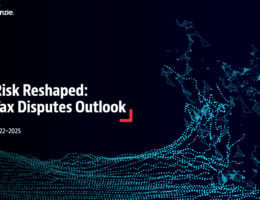The Inland Revenue Authority of Singapore (IRAS) updated its guidelines on general anti-avoidance on 31 March 2023, with the release of the IRAS e-Tax Guide: “Income Tax: The General Anti-Avoidance Provision and its Application (Second Edition)” (“Revised Anti-Avoidance ETG”).
The Revised Anti-Avoidance ETG sets out additional examples of arrangements that IRAS considers to fall under the general anti-avoidance provision set out in Section 33 of the Income Tax Act 1947. It is helpful in providing taxpayers with greater clarity on IRAS’ approach to Section 33.
The OECD has provided further updates on its Pillar 2 initiative and some countries have responded with their intention to implement as early as 2024. In this episode, Ciro Meza, Miles Humphrey, and Allen Tan highlight key points of the new guidelines, questions that companies have been raising and how these may affect TMT companies. Since the impact of Pillar 2 will transcend various functions within a business, Baker McKenzie experts will share their insights on how TMT companies should react to these developments and when they should start taking action in light of the implementation timelines that have been announced.
Budget 2023 focuses on building a more resilient and innovative Singapore. As the country emerges from the Covid-19 pandemic, the nation now contends with inflationary pressures in the midst of global uncertainty. Budget 2023 seeks to provide support to businesses and households to weather the challenges ahead while ensuring that Singapore continues to uphold fiscal prudence.
Singapore Budget 2022 makes significant strides in charting Singapore’s path into the future. As the nation faces an ageing population and seeks to recover from a prolonged pandemic amidst an increasingly volatile global landscape, Budget 2022 aims to prepare Singapore to meet these challenges while securing the opportunities of the future. What is of particular note in Budget 2022 is the announcement of changes to the tax system that are broadly aimed at building a fairer and more resilient revenue structure for Singapore. Importantly, Singapore is exploring the possible introduction of a minimum effective tax rate for multinational enterprise groups.
Rapid business transformation across the globe and shifting international policy are driving significant changes to organizations’ tax exposure, financial resilience, strategy and management. These factors are shaping how companies across every sector approach the future of tax dispute resolution.
Our latest report draws on an independent survey of 1,200 tax leaders in 10 jurisdictions and across six sectors conducted in late 2021 and insights from our tax disputes and international tax teams.
In a curated Roundtable session, hosted by the Singapore Economic Development Board (EDB) and Baker McKenzie Wong & Leow, representatives from large multinationals across a diverse range of sectors joined the EDB and the Inland Revenue Authority of Singapore to discuss global tax reforms led by the Organisation for Economic Co-operation and Development and future differentiations in Singapore’s economic strategy.
The Inland Revenue Authority of Singapore (‘IRAS’) updated its transfer pricing guidelines on 10 August 2021, with the release of the IRAS e-Tax Guide: Transfer Pricing Guidelines (Sixth Edition).. IRAS has provided additional guidance and clarification with respect to TP documentation compliance, surcharges on TP adjustments, advanced pricing arrangements and mutual agreement procedure requests.
From November 2020 to April 2021, there have been three reported decisions by the High Court and Court of Appeal involving tax controversies with the Inland Revenue Authority of Singapore. Two of these decisions involved disputes under the Income Tax Act. The final case relates to a decision concerning the assessment of property tax, and the interpretation of certain terms under the Property Tax Act.
From November 2020 to April 2021, there have been three reported decisions by the High Court (HC) and Court of Appeal (CA) involving tax controversies with the Inland Revenue Authority of Singapore (IRAS). Two of these decisions by the HC involved disputes under the Income Tax Act (ITA). The first case pertained to the application of the general anti-avoidance provision in s 33 of the ITA, and the second case concerned the taxability of an employee’s severance payment under s 10(2)(a) of the ITA.
Due to the strategic location and the business-friendly environment that Singapore offers, many multinational enterprise (MNE) groups have centralized operations in Singapore, and they often function as the global/regional headquarters (HQ) of the MNEs. With increasing focus on these structures and the associated transfer pricing arrangements (both domestically and overseas), the Inland Revenue Authority of Singapore (IRAS) published an e-tax guide entitled “Transfer Pricing Guidelines Special Topic – Centralized Activities in Multinational Enterprise Groups” (“Guide”) on 19 March 2021 to provide administrative guidance on determining an arm’s length remuneration for centralized activities in Singapore.
In this alert, we discuss the Guide, and provide transfer pricing insights for HQs located in Singapore.









